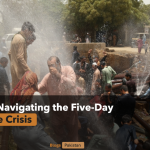In a landmark move toward digitizing civic services, Pakistan’s National Database and Registration Authority (NADRA) has unveiled a nationwide digital system for birth and death registration. This transformative initiative, part of the broader Uraan Pakistan program, promises to redefine how citizens interact with essential documentation services while boosting governance efficiency.
Breaking Down NADRA’s New Digital Ecosystem
From Paper Trails to Digital Footprints
Gone are the days of manual record-keeping in dusty ledgers. NADRA’s upgraded Digital Birth and Death Registration System now enables hospitals and healthcare centers to directly update national databases in real time. This collaborative effort with provincial governments and the World Bank aims to:
- Eliminate bureaucratic delays in documentation
- Create a centralized, tamper-proof national registry
- Generate accurate demographic data for policy planning
![Flowchart showing digital registration process from hospital to NADRA database]
Alt Text: NADRA’s seamless digital registration workflow for birth/death records
How the System Works: A Step-by-Step Guide
- Data Collection: Healthcare providers input birth/death details into secure portals
- Biometric Verification: Parents/relatives authenticate information via fingerprint scans
- Instant Certification: Automated generation of digital certificates with QR codes
- National Sync: Records immediately update NADRA’s central database
“This system reduces registration time from weeks to minutes,” says NADRA Chairperson Tariq Malik. “It’s a game-changer for public service delivery.”
Uraan Pakistan: The Tech-Driven Governance Overhaul
Building Blocks of the Digital Economy
The registration upgrade forms the backbone of two critical initiatives:
- Digital ID Evolution: Biometrically verified identities linked to life events
- Digital Economy Enhancement Project (DEEP): World Bank-funded infrastructure for e-governance
These programs position Pakistan among nations using technology to:
- Combat identity fraud (estimated 12% of pre-digital CNICs were fraudulent)
- Enable data-driven welfare programs
- Streamline access to education and healthcare services
Provincial Partnerships: Who’s On Board?
NADRA has already activated the system through agreements with:
- Sindh Government: 47 major hospitals integrated
- Balochistan: 22 healthcare centers operational
- Upcoming: Azad Jammu & Kashmir and Gilgit-Baltistan in final negotiation stages
Free CNICs: NADRA’s Inclusion Masterstroke
Removing Barriers to Citizenship
In tandem with the registration overhaul, NADRA’s free first-time CNIC policy addresses a critical gap:
- 34% of Pakistani women lacked national IDs as per 2021 surveys
- Marginalized communities often avoided registration due to costs
Key Features of the Initiative:
- No fees for first-time applicants aged 18+
- Non-chip ID cards with enhanced security features
- 15-day processing guarantee through prioritized queues
![Smartphone screen showing NADRA’s CNIC application process]
Alt Text: User-friendly digital interface for NADRA’s free CNIC service
Impact on Ground: Stories from Registration Centers
Lahore resident Ayesha Riaz shares: “I got my daughter’s birth certificate and my CNIC in one visit—no endless trips to offices.” For daily wage workers like Karachi’s Ahmed Khan, the fee waiver meant finally obtaining proof of citizenship: “Now I can open a bank account.”
The Ripple Effects: Why This Matters Beyond Paperwork
Health Sector Transformation
Real-time death registration enables:
- Faster processing of inheritance claims
- Accurate mortality statistics for disease tracking
- Reduced property disputes (30% of court cases relate to inheritance)
Economic Implications
The World Bank estimates Pakistan’s digital economy could grow by $60 billion by 2030 through initiatives like:
- Credit Accessibility: Verified identities enable micro-loans for unbanked populations
- Employment Tracking: Formalizing labor data for better job market insights
- Social Security: Targeted welfare distribution using updated registries
Security in the Digital Age: Addressing Concerns
Fortifying Against Cyber Threats
NADRA’s new systems incorporate:
- Blockchain-based data encryption
- Multi-factor authentication for healthcare providers
- AI-powered anomaly detection to flag suspicious activity
“We’ve conducted 12 cybersecurity drills with international experts,” assures NADRA’s IT Director Saadia Khan. “Citizen data remains protected.”
Bridging the Urban-Rural Divide
Mobile Registration Units Hit the Road
To reach remote areas, NADRA has deployed:
- 58 mobile registration vans with satellite connectivity
- Female-only teams to encourage women’s participation
- Community awareness campaigns in regional languages
Village elder Malik Noor in Tharparkar confirms: “The van came to our settlement—children born at home finally got birth certificates.”
Looking Ahead: NADRA’s Roadmap for 2024–2025
Upcoming Features to Watch
- Automated Inheritance Processing: Linking death certificates to property transfers
- Cross-Border Integration: Sharing data with embassies for diaspora services
- Disaster Response Mode: Emergency registration protocols for flood/earthquake zones
As Pakistan strides toward its digital future, NADRA’s initiatives exemplify how technology can transform governance from a bureaucratic hurdle into an empowering tool. For millions, this isn’t just about certificates and IDs—it’s about claiming their rightful place in the nation’s evolving story.










